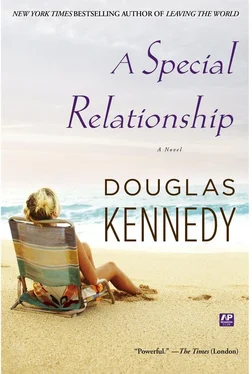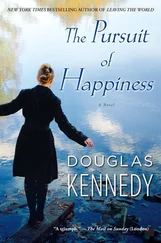As soon as I received this email, I wrote him a reply, explaining that, as before, my newborn son was keeping me in London, but would the paper be willing to offer me a freelance contract for a few stories a month from this part of the world? I also played up the years of loyalty I had given to the paper, that I wasn't asking for a staff position, and also intimated (in as subtle a way as possible) that I really needed the work.
Thomas Richardson was always efficient, and his response arrived on my computer a few hours later.
Dear Sally:
If it was my call, you'd still be one of our correspondents in London. But my hands are tied by the money-men - and they are adamant: no additional staff or freelancers at any of our ever-dwindling foreign bureaus.
I'm truly sorry about this.
So that was that. I had no choice but to start working the British papers again. Here, the problem was: nobody knew who I was (and I certainly wasn't going to play the 'I'm Tony Hobbs's estranged wife' card, as it might just blow up in my face). Still, after about a week of nonstop phoning, the features editors I managed to get through to at the Guardian and the Observer asked for ideas by email and samples of my work. Well, I sent off the requisite clippings and a couple of ideas. A week went by. I made the requisite follow-up phone calls. The editors were otherwise engaged. I followed up with reminder emails. No response. Which is what I expected - as journalism works that way. Especially if - in the eyes of the people to whom you're trying to sell an idea - you're a nonentity.
Even Margaret's husband, Alexander, made a couple of transatlantic calls on my behalf, seeing if there was something for me at Sullivan and Cromwell in London. I sensed that guilt about steering me into the hands of Lawrence and Lambert was behind his efforts on my behalf (that - and Margaret probably screaming at him to redress the mess by helping me out). But as I told Alexander, I had no skills that would be of use in a law firm. His colleagues in London concurred. I was neither a legal secretary, nor a legal writer, nor did I possess any qualification at all that allowed me to practise as an attorney. So all I could do was thank Alexander for his efforts on my behalf and tell him to stop feeling guilty about the incompetent Ginny Ricks. It wasn't his fault.
But if the job search was bearing nothing, at least I seemed to be in the good books of my handlers from the Wandsworth contact centre. I showed up for my weekly visits fifteen minutes early. Clarice told me that I seemed to be bonding well (that verb again) with Jack, and he was happily awake for all our sessions, which meant that I could feed him, and change his nappy, and try to get him interested in assorted infant toys, and hold him close, and wish to God that I didn't have to hand him back at the end of the hour. I resolved not to cry anymore during these sessions, deciding that I needed to show a certain stability and equilibrium in front of Clarice, to prove that I was dealing with the enforced separation from my son, even though it was agony. But as soon as the session was over I would walk slowly out of the building, my head bowed, and stumble out into the grey, litter-strewn shabbiness of Garratt Lane, and find the nearest wall, and put my head against it, and cry like a fool for a minute or so, and then collect myself and try to get through the rest of the day.
At heart, all grief centres around the realization that you can never escape the bereavement that has stricken you. There may be moments when you can cope with its severity; when the harshness temporarily lessens. But the real problem with grief is its perpetuity. It doesn't go away. And though you are, on one level, always crying for the loss you've sustained, you're also crying because you realize you're now stuck with the loss, that - try as you might - it's become an intrinsic part of you, and will change the way you look at things for ever.
I didn't mention these cry-like-a-fool post-visitation moments to Jessica Law. All I would tell her was, 'I find this situation desperately hard'.
She'd look at me with a mixture of professional coolness and personal compassion, and say, 'I am aware of that'.
What else could she say - that, like a massive migraine, it would eventually abate? It wouldn't. We both knew that. Just as we both knew that - given the evidence stacked against me - the best I could hope for at the time of the Final Hearing was some sort of shared visitation situation.
'I do hope that you keep your expectations about a future with Jack realistic', she said during our third 'chat'.
'In other words, I'm not going to get him back'.
'I didn't say that, Sally. And a lot could happen in the four-and-a-half months. But the truth is...'
She paused, trying to find the right neutral language. I decided to cut to the chase.
'I've been declared an unfit mother - and once that's on the record, it's hard to erase'.
'Yes, I'm afraid that's exactly it. But that doesn't mean that an arrangement can't be worked out with the court. It may not be perfect. It may not give you the access you want. But it will be better than what you have now'.
After this conversation, I sensed that, in her own circumspect way, she was hinting that she didn't consider me unsuited to motherhood. Just as she was gently compelling me to grasp the reality of my situation. Whereas Sandy kept telling me not to lose hope in order to move forward, Jessica Law was inverting that same sentence: in order to move forward, you have to lose hope.
As I made my way home from my fourth supervised visit with Jack, trudging through the rain down West Hill, the American in me didn't want to accept the pragmatic pessimism which Jessica Law espoused, and which struck me as so desperately English. I wanted to embrace that old hoary American fighting spirit. No wonder the English were so privately attracted to the pastoral. It was an antidote to all that hard-headed realism - the recognition that the Elysian Fields were merely the stuff of folklore, undermined by the merciless reality of class, personal limitations, and the crushing purposelessness of life which you must still somehow confront to give order and shape to the day.
Whereas, like most Americans, I was brought up on that stale mythological idea that, with hard work and boundless optimism, you could be what you wanted to be - that the world was infinite in its possibilities and there for the taking.
In order to move forward, you have to lose hope.
The entire abstract logic of that statement was anathema to me. But as I turned into Sefton Street - and looked at the tidy terraces of middle class houses, and saw a nanny loading her infant charge into the baby seat of a Land Rover, and remembered how Jack nuzzled his head against my cheek just ten minutes earlier, and realized that, like it or not, I would have to confront the letter which currently resided in the back pocket of my jeans (a letter from Tony's solicitors, informing me that the twenty-eight-day grace period had passed, and they would now take legal steps within seven days to put our house on the market unless I accepted their financial offer) - I stopped moving. And I suddenly lost all hope.
I sat down on the hood of a car parked outside my house, and started to cry again - fully cognizant that I was weeping on the street where I lived, and unable to get myself through the doorway and into the home that would soon be taken away from me.
'Sally?'
It took me a moment to realize that someone had just called my name. Because I wasn't used to being called by my name on Sefton Street. I knew no one there. Except...
'Sally?'
I looked up. There was my neighbour, Julia Frank - the woman whom I'd met in the newsagent's all those months ago. Now standing by me, her arm on my arm.
Читать дальше












